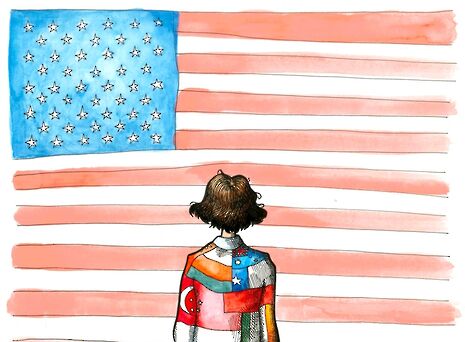The fragility of citizenship
Legally American, yet raised for most of her life abroad, Allison O’Malley Graham considers the implications in attempting to define home

As an American abroad, U.S. politics is something I usually try to avoid. To some, it must look like cowardice - who am I to dodge their pointed questions about the war in Iraq, or Trump’s Muslim Ban? It is, I’ll admit, cowardice - but not the cowardice of an American refusing to acknowledge their country’s shortcomings; rather, I’m afraid of being tied to a country I don’t call ‘home.’
Being an American born abroad and made American only through my father is a lesson in the fragility of citizenship, home, and belonging. While I’d sooner run off to fight for Australia in a second Great Emu War, many undocumented immigrants in the United States would, and do, enlist on behalf of the U.S. Yet if anything were to befall us, and we were to seek help abroad, the Australian government wouldn’t lift a finger to help me. The U.S. government would not help them. If nationality and belonging are about more than the law, how is it that legal privilege can be so at odds with any sense of belonging?
Oaths of citizenship don’t erase the years that go into building a sense of home. They cannot undo culture, heritage, or memory
I’ve spent my life running from an American identity, training myself to never say “y’all” and emphasising an Irish accent I didn’t actually learn from my Irish mother. Born in Singapore and raised by an American father and an Irish mother, identifying as simply ‘American’ seems ridiculous. Sure, I have a U.S. passport, but I spent far more of my life in Chile, Australia, and Oman. 'Colour' will forever have a ‘u’, and football will always be played with a round ball.
Short of burning my passport and resigning myself to mind-boggling immigration lines every time I visit my American family, I can’t change the fact that, regardless of my own idea of ‘home’, being legally American is something I can’t shake. Nor can I shake the fact that this legal status shapes how others understand where I belong, let alone how I understand it. I first learned this lesson as an 8 year-old in Oman, struggling to figure out who George W. Bush was as an older student accused me of undermining peace in the Middle East. At the time, I thought the leader of my country was not the U.S. president, but the Sultan of Oman. Still, I walked away from that dress-down realising that my notion of home, and of myself, was shaky. No one would ever take me to task on Omani politics - why would they?
Nine years on, sat in class in Indonesia and watching the U.S. election results in real time (unfortunately, we didn’t get to sleep through the ordeal), I faced anger and disgust from my classmates. Rightly so. Outside, heartbroken American teachers pulled me aside and went to great lengths to explain what ‘we’ could do to represent our country. In the library, the news, and online, I was being asked what it meant to be an American. Scrolling through my Facebook feed that evening, I had a different question: what makes /me/ American? Is citizenship alone enough to define ‘home’? Unlike many Americans that day, I struggled not with the idea of Donald Trump as my president, but with the idea that any American president could be my representative.
There is a continual frustration with being connected to a culture you don’t understand; with knowing that you owe a great deal to your passport, but wishing it reflected your identity
Home, citizenship, and belonging are only becoming more complicated as the arcs we travel around the world widen. So what, then, does it mean to lay claim to a country, and to call a place ‘home’? It’s an idea that, obviously, I struggle with. During Freshers’ week, countless British-born and British-raised kids confessed an envy of my upbringing; I, meanwhile, envy them. There is a continual frustration in having your sense of ‘home’ fail to line up with how others perceive it; with being connected to a culture you don’t understand; with knowing that you owe a great deal to your passport, but wishing it reflected your identity. Isn’t it laughable to call a place ‘home’ if I need a visa to get there? How do I explain my loyalty to a country that bears no loyalty to me?
As an American, these particular issues are even more difficult in light of the U.S. immigration system. It would be easy to say that law does not determine identity, but clearly that takes the role of law for granted. I struggle to understand how in the United States, I have more right to be at home there than a child brought across the border 15 years ago. There are undocumented immigrants who salute the U.S. flag with far more ease than I ever could, and sing the national anthem proudly while I struggle to remember the words. Are they somehow less American than I am? Surely that makes no sense.
If nationality and belonging are about more than the law, how is it that legal privilege can be so at odds with any sense of belonging?
It seems ungrateful to struggle so much with an American identity, knowing full well that so many others struggle to lay claim to it. And worse, that they struggle for their families, livelihoods, and safety because of it. I won’t mince words: watching others sit an exam, hire lawyers, and march in the streets for the right to be ‘from’ or ‘of’ the United States makes me feel equal parts guilty and infuriated. Guilty, because my own internal struggle pales in comparison to theirs. The complaint seems ridiculous - a problem of privilege if ever there was one. But my comfort in holding an American identity will do nothing to bring them to it; our differing experiences with notions of ‘American’ identity and belonging only illustrate how tenuous legal claims to identity can be. It reveals flaws in the system.
More than anything, I’m infuriated by this discrepancy between us. Our legal ability to ‘belong’, in the face of our lived experiences, is arbitrary. If Americans can claim me as their countrywoman without hesitation, there is no reason not to extend that same courtesy to so many others. I know no way of reconciling the reality of lived experience with the reality of the law.
Our ideas of belonging and home are so much larger than the law, as much as they may be influenced by it. My mother’s decision to take on American citizenship wasn’t driven by any belonging, but by shorter immigration lines. Oaths of citizenship don’t erase the years that go into building a sense of home. They cannot undo culture, heritage, or memory. Yet legal citizenship brings the privilege of claiming and being claimed by a country - especially one as powerful (for better or worse) as the United States. It legitimises.
While I can’t define ‘home’ with any certainty, I can say that it’s larger than one definition, whether legal, colloquial, or anything in-between. Law might not dictate who I cheer for in the Olympics, but it does have a say in where I belong. I’ll never escape questions about Trump or Bush, or even about how American football works, and that connection to all things American will never cease to annoy me. As trapped as I may feel by this fact, I’m learning to accept that my passport may never reflect who I am. The law is only one part - not the whole - of who we are.
 News / Colleges charge different rents for the same Castle Street accommodation2 March 2026
News / Colleges charge different rents for the same Castle Street accommodation2 March 2026 News / King’s hosts open iftar for Ramadan3 March 2026
News / King’s hosts open iftar for Ramadan3 March 2026 Theatre / Lunatics and leisure centres 4 March 2026
Theatre / Lunatics and leisure centres 4 March 2026 News / Angela Merkel among Cambridge honorary degree nominees27 February 2026
News / Angela Merkel among Cambridge honorary degree nominees27 February 2026 News / News in Brief: waterworks, wine woes, and workplace wins 1 March 2026
News / News in Brief: waterworks, wine woes, and workplace wins 1 March 2026









